ESAU AND JACOB part-1
Though tried in a similar way to his father, he did not follow the same crooked policy. Twenty years he continued unblessed with offspring, whose seed was to be “as the stars” [Genesis 26:4 ].
But in answer to their mutual prayers (1 Peter 3:7), Rebekah was divinely informed that she was to be the mother of twins, who should be the progenitors of two independent nations;
that the descendants of the younger should be the more powerful and subdue those of the other (Romans 9:12; 2 Chronicles 21:8).
Finally, Genesis 25 turns its attention to Isaac, now the patriarch. As was the case with his mother Sarah, his wife Rebekah does not become pregnant.
In fact, 20 or so childless years pass. At some point, Isaac prays to the Lord. The Lord hears and answers, and Rebekah becomes pregnant (Genesis 25:19–21).
Her pregnancy is so difficult that Rebekah approaches the Lord to ask Him why. She receives a prophecy about the “two nations” in her womb that will be divided.
The older will serve the younger. This prophecy likely makes more sense to her when she delivers twins.
Genesis 25:19-24 KJV
[19] And these are the generations of Isaac, Abraham’s son: Abraham begat Isaac:
[20] And Isaac was forty years old when he took Rebekah to wife, the daughter of Bethuel the Syrian of Padan–aram, the sister to Laban the Syrian.
[21] And Isaac intreated the LORD for his wife, because she was barren: and the LORD was intreated of him, and Rebekah his wife conceived.
[22] And the children struggled together within her; and she said, If it be so, why am I thus? And she went to enquire of the LORD.
[23] And the LORD said unto her, Two nations are in thy womb, and two manner of people shall be separated from thy bowels; and the one people shall be stronger than the other people; and the elder shall serve the younger.
[24] And when her days to be delivered were fulfilled, behold, there were twins in her womb.
Genesis 25:19 KJV
And these are the generations of Isaac, Abraham’s son: Abraham begat Isaac:
 Having concluded a summary describing the sons and descendants of Ishmael, Genesis 25 begins the much longer telling of the “generations of Isaac.”
Having concluded a summary describing the sons and descendants of Ishmael, Genesis 25 begins the much longer telling of the “generations of Isaac.”
After formally establishing that Abraham fathered Isaac, Isaac’s story officially begins with his marriage to Rebekah and the birth of his twin sons Jacob and Esau.
Isaac seems not to have been much tried, but to have spent his days in quietness. Jacob and Esau were prayed for; their parents, after being long childless, obtained them by prayer.
The fulfilment of God’s promise is always sure, yet it is often slow. The faith of believers is tried, their patience exercised, and mercies long waited for are more welcome when they come.
This is the line we are going to follow. “Abraham begat Isaac; and Isaac begat Jacob” is the way the first chapter of Matthew begins. Each of these men had other sons, as we have seen.
Abraham had quite a few sons, but the genealogy of those men is not followed. It is the genealogy of Isaac that is followed. You can forget Ishmael and Midian and Medan and all the rest.
They will cross paths with the descendants of Isaac time and again, but we will not follow their lines.
Genesis 25:20 KJV
And Isaac was forty years old when he took Rebekah to wife, the daughter of Bethuel the Syrian of Padan–aram, the sister to Laban the Syrian.
 Isaac seems not to have been much tried, but to have spent his days in quietness. This verse summarizes the events of Genesis 24, in which Abraham’s servant travelled to the land of his people to find a wife for Isaac.
Isaac seems not to have been much tried, but to have spent his days in quietness. This verse summarizes the events of Genesis 24, in which Abraham’s servant travelled to the land of his people to find a wife for Isaac.
We now learn that Abraham’s people are Aramean. This family lived in the town named for Abraham’s brother Nahor (Genesis 22:20–24), which was in the northern Mesopotamian region of Paddan-aram.
Rebekah’s father Bethuel and brother Laban are mentioned specifically. Later, Jacob will travel to Paddan-aram and become associated with Rebekah’s brother Laban.
Isaac married Rebekah when he was 40, about 35 years before the death of Abraham (Genesis 17:17; 25:7).
Isaac and Rebekah kept in view the promise of all nations being blessed in their posterity, therefore were not only desirous of children, but anxious concerning every thing which seemed to mark their future character.
In all our doubts we should inquire of the Lord by prayer. In many of our conflicts with sin and temptation, we may adopt Rebekah’s words, “If it be so, why am I thus?”
If a child of God, why so careless or carnal?
If not a child of God, why so afraid of, or so burdened with sin?
Genesis 25:21 KJV
And Isaac intreated the LORD for his wife, because she was barren: and the LORD was intreated of him, and Rebekah his wife conceived.
 Jacob and Esau were prayed for; their parents, after being long childless, obtained them by prayer. The fulfilment of God’s promise is always sure, yet it is often slow.
Jacob and Esau were prayed for; their parents, after being long childless, obtained them by prayer. The fulfilment of God’s promise is always sure, yet it is often slow.
The faith of believers is tried, their patience exercised, and mercies long waited for are more welcome when they come.
Once again, both barrenness and God’s intervention play a role in the birth of the next generation in the line of God’s people.
Rebekah remained barren for a time, unable to have children. Isaac’s mother, Sarah, remained childless until she was 90 (Genesis 17:17; 21:1–2).
We’re not told how much time passed between Isaac’s prayer and Rebekah’s pregnancy, but we do learn that Isaac was 60 when his sons are eventually born.
That means the couple remained childless for 20 years. The important thing to note is that Isaac took action. Prayer is action. He prayed to the Lord for his wife. God responded to Isaac’s prayer.
God had promised that multitudes would come from Abraham, but each birth in the line of God’s chosen people thus far seems to have required special intervention from God Himself to take place.
God’s people understood that their children were gifts from Him. It is interesting that Rebekah, like Sarah, was barren. But Isaac pled with God on her behalf, and now she is pregnant with twins.
Genesis 25:22 KJV
And the children struggled together within her; and she said, If it be so, why am I thus? And she went to enquire of the LORD.
 Isaac and Rebekah kept in view the promise of all nations being blessed in their posterity, therefore were not only desirous of children, but anxious concerning every thing which seemed to mark their future character.
Isaac and Rebekah kept in view the promise of all nations being blessed in their posterity, therefore were not only desirous of children, but anxious concerning every thing which seemed to mark their future character.
In all our doubts we should inquire of the Lord by prayer.
In many of our conflicts with sin and temptation, we may adopt Rebekah’s words, “If it be so, why am I thus?” If a child of God, why so careless or carnal?
If not a child of God, why so afraid of, or so burdened with sin?
Rebekah, formerly unable to have children, becomes pregnant after Isaac prays to the Lord for her. In fact, she is carrying the double blessing of twins.
Rebekah likely doesn’t know she is carrying twins, and her pregnancy doesn’t appear to have felt especially “blessed” to her. Carrying two children at once is hard enough, but these unborn rivals seem particularly active.
As this verse notes, the twins are “struggling” against each other, a comment which makes more sense once we’ve seen all that will occur between them in the future.
The kicking and writhing of the children in her womb grows to the extent that it worries Rebekah. Keep in mind that Rebekah does not have the medical technology available in the modern era.
She probably has no idea that she’s bearing twins. All she knows is that something is wrong. The struggle within her gets so bad for Rebekah that she finally wonders “why is this happening to me?” or perhaps “why am I here?”
Overcome, she goes to inquire of the Lord. We’re not told what form her prayer may have taken.
It’s possible she went to a sacred place or consulted a prophet, but she does receive a very specific response from the Lord in the following verse.
The struggle of these two boys, which began before their birth, represents the struggle which still goes on in the world today. There is a struggle between light and darkness, between good and evil, between the Spirit and the flesh.
Every child of God knows something of this struggle which Paul sets before us in the seventh chapter of Romans.
Rebekah didn’t understand the struggle which was going on within her, and she went to the Lord with the question, “Why am I thus?”
Genesis 25:23 KJV
And the LORD said unto her, Two nations are in thy womb, and two manner of people shall be separated from thy bowels; and the one people shall be stronger than the other people; and the elder shall serve the younger.
 Rebekah, overwhelmed by the difficulty of her pregnancy, decides to approach the Lord to find out what is going on. The children inside of her are “struggling” so much that she’s become concerned (Genesis 25:22).
Rebekah, overwhelmed by the difficulty of her pregnancy, decides to approach the Lord to find out what is going on. The children inside of her are “struggling” so much that she’s become concerned (Genesis 25:22).
Modern readers should remember that Isaac and Rebekah didn’t have the same kind of medical tools available to us today; more than likely, she has no idea that there are actually two children in her womb.
All she knows is that the turbulence she feels is not right; this is not a normal part of pregnancy. In seeking God’s answer, Rebekah may have consulted a prophet of some sort.
We don’t know. She does, however, receive a very specific prophesy given in the form of a poem.
The prophecy may have seemed vague and unhelpful at this specific point in Rebekah’s life, but it describes what is to come very clearly.
Rebekah’s two sons, Jacob and Esau, would indeed become two peoples or nations. Their relationship would be marked from the beginning by conflict and division.
One would be stronger, but the older one would become a slave or servant to the younger one. The Lord’s answer to Rebekah’s prayer began to be fulfilled very soon, as the following verses reveal.
God makes the statement to her that the elder shall serve the younger. She should have believed it, and her younger son should have believed it.
Genesis 25:24 KJV
And when her days to be delivered were fulfilled, behold, there were twins in her womb.
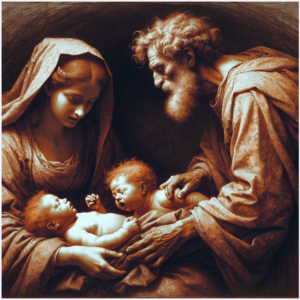 These events occurred thousands of years before mankind developed the technology to look at an unborn child prior to birth.
These events occurred thousands of years before mankind developed the technology to look at an unborn child prior to birth.
Rebekah, up to this point, only knows that there has been constant commotion—a “struggle”—inside her womb during this pregnancy (Genesis 25:22).
In most cases, there would have been no way to know that a woman was bearing twins until delivery was complete. More than likely, this was the case with Rebekah.
Beyond the surprise of having two sons, rather than just one, their birth would have made the prophecy about them given in the previous verse much clearer (Genesis 25:23).
These two children would eventually become two nations.

ESAU AND JACOB part-2
The firstborn is red and hairy, and they name him Esau. The second is called “heel grabber,” Jacob, because he emerges with Esau’s heel in his hand (Genesis 25:22–26).
The pair grow into very different sorts of men. Esau, the outdoorsman and hunter, is loved by his father for bringing home the meat. Jacob, a quiet, stay-at-home fellow is loved by his mother (Genesis 25:27–28).
This is more than simple preference. Later passages will show that each parent blatantly favors one child over the other, leading to further strife and rivalry.
The chapter ends with a scene between Jacob and Esau that flatters neither. Esau returns from the fields exhausted and asks for a bowl of Jacob’s red stew.
Jacob demands Esau’s birthright in exchange for the stew. Esau foolishly agrees, swearing an oath to seal the deal. Jacob gladly accepts the payment and shares what turns out to be lentil soup.
Genesis 25:25-34 KJV
[25] And the first came out red, all over like an hairy garment; and they called his name Esau.
[26] And after that came his brother out, and his hand took hold on Esau’s heel; and his name was called Jacob: and Isaac was threescore years old when she bare them.
[27] And the boys grew: and Esau was a cunning hunter, a man of the field; and Jacob was a plain man, dwelling in tents.
[28] And Isaac loved Esau, because he did eat of his venison: but Rebekah loved Jacob.
[29] And Jacob sod pottage: and Esau came from the field, and he was faint:
[30] And Esau said to Jacob, Feed me, I pray thee, with that same red pottage; for I am faint: therefore was his name called Edom.
[31] And Jacob said, Sell me this day thy birthright.
[32] And Esau said, Behold, I am at the point to die: and what profit shall this birthright do to me?
[33] And Jacob said, Swear to me this day; and he sware unto him: and he sold his birthright unto Jacob.
[34] Then Jacob gave Esau bread and pottage of lentiles; and he did eat and drink, and rose up, and went his way: thus Esau despised his birthright.
Genesis 25:25 KJV
And the first came out red, all over like an hairy garment; and they called his name Esau.
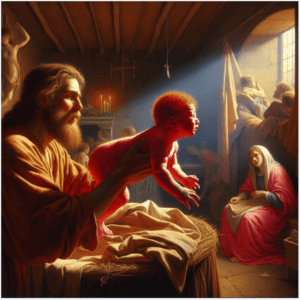 Rebekah sought out an answer from God, concerned about her unusually difficult pregnancy (Genesis 25:22). The “struggle” she felt was not normal, and she almost certainly did not know she was bearing twins.
Rebekah sought out an answer from God, concerned about her unusually difficult pregnancy (Genesis 25:22). The “struggle” she felt was not normal, and she almost certainly did not know she was bearing twins.
Her answer came in the form of a prophetic poem, indicating that there were two “nations” in her womb (Genesis 25:23). In verses 25 and 26, the meaning of this statement will become clearer to Isaac and Rebekah.
The first of Isaac’s and Rebekah’s twin boys emerges both red and hairy. It’s unclear if the “redness” refers to a ruddy complexion or to his hair color, or possibly both.
Red was often associated with “ruggedness,” or manliness, and this child will grow into a stereotypically masculine figure (Genesis 25:27).
His hairiness, at least at birth, is so remarkable as to establish the name given to him: Esau. The Hebrew root se’ar refers to hair or hairiness. The name E’sav, then, suggests a hairy fellow.
Esau’s younger brother is born in the next verse. Jacob’s unique birth also gives him his name and predicts his character. Jacob will be a quiet, indoor man, and also known for trickery: he’s both literally and figuratively a “leg puller.”
The name Esau means “red” or “earth-colored” Because he is born first, he is considered the elder. But the elder is to serve the younger.
Genesis 25:26 KJV
And after that came his brother out, and his hand took hold on Esau’s heel; and his name was called Jacob: and Isaac was threescore years old when she bare them.
 The first twin emerged both red and hairy. His name, Esau, somehow describes his hairiness. The second twin is neither red nor hairy, compared to his twin, but he is also named for his first impression on his parents.
The first twin emerged both red and hairy. His name, Esau, somehow describes his hairiness. The second twin is neither red nor hairy, compared to his twin, but he is also named for his first impression on his parents.
He comes into the world grabbing his brother’s heel. The Hebrew word for heel is ‘aqeb, and so this child is named Ya’aqob, or Jacob, literally meaning “he clutches the heel.”
Interestingly, though, and also important, Jacob can mean “may God protect or reward,” or—unfortunately for Esau—it can also mean “usurper.”
Interestingly, in English at least, the phrase “pulling my leg” means “joking with me,” or “lying to me.” Jacob’s future will be heavily influenced by acts of deception (Genesis 25:29–34; 27:30–35). Some of those will be at his own expense (Genesis 29).
While there’s no direct connection between his Hebrew name and the English idiom, Hebrew verbs similar to Jacob’s name refer to those who “watch from behind” or “trip up” others, a reference to trickery.
In practical terms, Jacob’s life is loaded with incidents of usurping—both in his favor, and to his disadvantage. We’re now told that Isaac was 60 years old when the twins were born.
These babies, as troubled as their relationship might be, were a direct answer to Isaac’s prayer that his wife would become pregnant.
After 20 years of childlessness, the couple were finally parents, twice over, and Abraham—now 160 years old—can finally glimpse the next generation of the covenant entering the scene.
Isaac and Rebekah had been married for about twenty years before the children were born. The older one was Esau, and they called him “Red” if you please.
Jacob took hold on Esau’s heel; so they called him Jacob, meaning the usurper, because he was trying to become the elder or to take his place—but God had already promised that to him.
Genesis 25:27 KJV
And the boys grew: and Esau was a cunning hunter, a man of the field; and Jacob was a plain man, dwelling in tents.
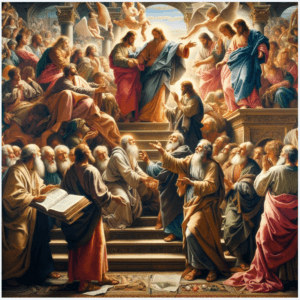 Esau hunted the beasts of the field with dexterity and success, till he became a conqueror, ruling over his neighbours.
Esau hunted the beasts of the field with dexterity and success, till he became a conqueror, ruling over his neighbours.
Jacob was a plain man, one that liked the true delights of retirement, better than all pretended pleasures.
He was a stranger and a pilgrim in his spirit, and a shepherd all his days. Leaping forward from their birth, Scripture now describes the kind of men Esau and Jacob become.
In both personality and interest, they are wildly different. Esau is a hunter, an outdoorsman. Great hunters were often seen as heroic figures in this era.
The ability to hunt not only meant an ability to provide for one’s family, it was also an indirect sign of being proficient with weapons—making such a person a more capable warrior than other men.
Jacob, on the other hand, became a quiet man. He liked to stay in the tents and, apparently, do indoor things.
Perhaps Jacob was an introvert. As we’ll see in the next verse, their personalities helped to determine their relationship with each of their parents.
Unfortunately, it becomes clear that the relationships they hold are imbalanced. There is a clear issue of favoritism at work, and it leads to serious problems in the family (Genesis 27:30–35).
It also, seemingly, shapes Jacob’s own parenting style, though not for the better (Genesis 37:1–4). Now we will look at these two boys as they grow up in this home.
Here they are, twins, but no two boys were ever more different than these two. They not only struggled in the womb, but they are against each other from here on out.
They have absolutely different viewpoints, different philosophies of life. Their thinking is different, and their attitudes are different. At the beginning, I must confess, Esau is more attractive than Jacob.
But we learn that one can’t always judge by the outward sign. We must judge by what takes place on the inside. We learn that in this particular case. “The boys grew.”
This fellow Esau was a cunning hunter, the outdoor boy, the athletic type. He is the one we would call the all-American boy today. He went in for sports.
He went in for everything that was physical, but he had no understanding or capacity or desire for spiritual things. He was only interested in that which was physical. He represents the flesh. Jacob was a plain man.
I think that you can make of that anything you want to. He lived indoors. He was mama’s boy and was tied to her apron strings. You will notice that he did what she told him to do.
Genesis 25:28 KJV
And Isaac loved Esau, because he did eat of his venison: but Rebekah loved Jacob.
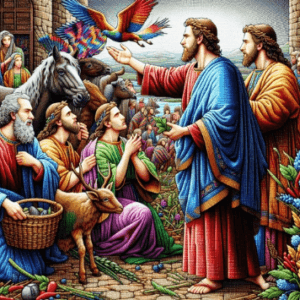 Jacob is really a mama’s boy. And this boy Esau is papa’s boy— Isaac and Rebekah had but these two children, one was the father’s darling, and the other the mother’s.
Jacob is really a mama’s boy. And this boy Esau is papa’s boy— Isaac and Rebekah had but these two children, one was the father’s darling, and the other the mother’s.
And though godly parents must feel their affections most drawn over towards a godly child, yet they will not show partiality. Let their affections lead them to do what is just and equal to every child, or evils will arise.
Now fully-grown men, the personalities and preferences of Esau and Jacob have been established. Esau is a hunter, an outdoorsman, apparently a man of action. Jacob prefers to stay in the tents. He’s a quiet person.
They bond with their parents accordingly. Isaac loves the manly son who brings home the game to eat. He’s likely proud of the firstborn boy known as the great hunter. Rebekah, however, loves her quiet, stay-at-home second-born son.
Those attachments will play an important role in what comes next. Upcoming passages will show that this “love” is hardly equally distributed; each parent clearly prefers one child over the other, and seemingly makes no secret of that fact.
Parental favoritism leads to problems, a lesson Jacob seems to forget when he has children of his own (Genesis 37:1–4). The twins’ divergent personalities also come with drawbacks.
Esau will prove to be somewhat reckless, even careless (Genesis 25:32). And Jacob is both manipulative and dishonest (Genesis 25:33).
While Esau will certainly feel the consequences of his actions (Genesis 25:34), Jacob will later experience, first-hand, what it’s like to be caught in a scam (Genesis 29). Here is the problem in the home.
You feel that under these circumstances they are going to have trouble, and they are. When one parent is partial to one child and the other parent is partial to the other child, you have trouble. That is exactly what took place here.
Isaac loved him because he ate of his venison. Esau went out hunting, and he always got something when he went hunting. He brought home the venison. Isaac liked that, and he liked this outdoor type of boy.
Rebekah loved Jacob because he was a mama’s boy. As I have said before, at this juncture the boy Esau is much more attractive than Jacob. He seems to be a more wholesome boy. The boy Jacob is cunning; he tries to be clever.
The fact of the matter is that he doesn’t mind stooping to do things that are absolutely wrong. (And God will deal with him for this.)
The interesting thing is that although Esau was very attractive on the outside, down underneath he really had no capacity for God whatever. If ever there was a man of the world, he is that man.
He is just a physical man and that is all. That is all that he lived for. Down underneath in Jacob there was a desire for the things that are spiritual.
It took God a long time to rub off all the debris that was on top and to remove all the coverings in order to get down to where the spiritual desire was, but He finally did it.
Before we are through with our study of Jacob (and his story goes almost all the way through the Book of Genesis), we will see that he was God’s man all along, although he didn’t demonstrate it until late in life.
Now we are told of an incident which took place in the home. You can well understand that the partiality shown by both father and mother would cause difficulty and conflict. I’ could not be called a happy home.
Genesis 25:29 KJV
And Jacob sod pottage: and Esau came from the field, and he was faint:
 The scene described in this and the following verses will reveal more fully the personalities of Jacob and Esau and determine the course of their relationship and fortunes. Jacob, the quiet, indoor brother, is cooking stew.
The scene described in this and the following verses will reveal more fully the personalities of Jacob and Esau and determine the course of their relationship and fortunes. Jacob, the quiet, indoor brother, is cooking stew.
Is this unusual work for a man, the son of the wealthy and powerful patriarch?
We are not told. Esau returns from working in the field, perhaps on a hunting expedition, and he is exhausted. As the following verses reveal, he is also desperately hungry.
Given his reactions in this passage, it might not have been a very successful trip. Esau seems hasty, and his attitude is unflattering. Of course, Jacob’s actions are also inappropriate.
Rather than simply giving his brother food, Jacob demands something outrageous in return. What might have seemed like a joke, at first, becomes a milestone event in Scripture (Hebrews 12:16).
This incident reveals the nature of both of these men. Esau came from the field. He had been outdoors, and he was tired. He was not starving to death as some would imply.
No one who had been brought up in the home of Abraham would starve to death. There would always be something for him to eat.
The thing was that there was nothing prepared right at that moment but this pottage, this stew, which Jacob had made. Jacob was the indoor boy. Evidently he was a good chef.
Genesis 25:30 KJV
And Esau said to Jacob, Feed me, I pray thee, with that same red pottage; for I am faint: therefore was his name called Edom.
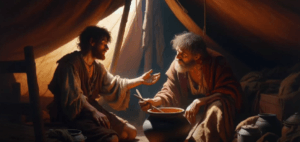 We have here the bargain made between Jacob and Esau about the right, which was Esau’s by birth, but Jacob’s by promise.
We have here the bargain made between Jacob and Esau about the right, which was Esau’s by birth, but Jacob’s by promise.
It was for a spiritual privilege; and we see Jacob’s desire of the birth-right, but he sought to obtain it by crooked courses, not like his character as a plain man.
He was right, that he coveted earnestly the best gifts; he was wrong, that he took advantage of his brother’s need. The inheritance of their father’s worldly goods did not descend to Jacob, and was not meant in this proposal.
But it includeth the future possession of the land of Canaan by his children’s children, and the covenant made with Abraham as to Christ the promised Seed. Believing Jacob valued these above all things; unbelieving Esau despised them.
Yet although we must be of Jacob’s judgment in seeking the birth-right, we ought carefully to avoid all guile, in seeking to obtain even the greatest advantages.
Jacob’s pottage pleased Esau’s eye. “Give me some of that red;” for this he was called Edom, or Red. Gratifying the sensual appetite ruins thousands of precious souls.
When men’s hearts walk after their own eyes, Job 31:7, and when they serve their own bellies, they are sure to be punished. If we use ourselves to deny ourselves, we break the force of most temptations.
Esau has returned from working in the field, perhaps from hunting, and he is exhausted. Jacob has been home. He has made stew, perhaps for himself.
Esau likes the look of the “red stew” and asks for some, describing how tired he is. Esau’s actions in the upcoming verses indicate some combination of desperation and carelessness.
Jacob’s behavior is just as unpleasant—he will demand an outrageous price for giving food to his own brother.
While it’s possible that Esau will take this as a joke, Jacob’s trickery results in consequences which are very real (Genesis 25:34).
We’re told in an aside that this is why Esau’s name is also called Edom, the name by which his people will later be known.
Apparently the word Edom is similar to the word for red, which describes both the color of the stew and the color of Esau’s hair or skin at his birth.
The Edomites will come to be bitter, spiteful enemies of Israel over the centuries (Obadiah 1:10–14).
“Feed me, I pray thee, with that same red (notice in your King James Version that the word pottage is in italics, meaning that the word has been supplied by the translators); for I am faint: therefore was his name called Edom.”
Edam means red or earthy just as Esau does. This man asks for some of the stew, and Jacob saw his chance.
Genesis 25:31 KJV
And Jacob said, Sell me this day thy birthright.
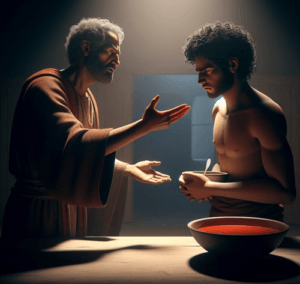 Yet although we must be of Jacob’s judgment in seeking the birth-right, we ought carefully to avoid all guile, in seeking to obtain even the greatest advantages. It cannot be supposed that Esau was dying of hunger in Isaac’s house.
Yet although we must be of Jacob’s judgment in seeking the birth-right, we ought carefully to avoid all guile, in seeking to obtain even the greatest advantages. It cannot be supposed that Esau was dying of hunger in Isaac’s house.
The words signify, I am going towards death; he seems to mean, I shall never live to inherit Canaan, or any of those future supposed blessings; and what signifies it who has them when I am dead and gone.
This would be the language of profaneness, with which the apostle brands him, #Heb 12:16|; and this contempt of the birth-right is blamed, ver. #34|.
It is the greatest folly to part with our interest in God, and Christ, and heaven, for the riches, honours, and pleasures of this world; it is as bad a bargain as his who sold a birth-right for a dish of pottage.
Esau, declaring himself exhausted after working in the field, has requested some of Jacob’s red stew (Genesis 25:29–30).
Jacob smells an opportunity or perhaps, understanding his brother’s lack of self-control, he has set this whole thing up ahead of time. Jacob seeks to make a deal. He says simply, “Sell me your birthright.”
The birthright, or “firstborn rights,” gave the firstborn son special privileges. For one thing, the firstborn was often entitled to a double share of the father’s property when he died.
The birthright may have come with other privileges, as well. Jacob is demanding a huge price for a bowl of stew. Esau may have thought this was a joke at first.
Even when Jacob doubles down on his request, demanding that Esau swear an oath (Genesis 25:33), it’s possible he didn’t take the situation seriously.
Jacob clearly does, however. And, he’ll perform an even more daring act of trickery later on (Genesis 27). Esau’s careless reaction costs him dearly.
Let’s stop and look for a minute at the value of the birthright and what it means. It means that the one who had it was the head of the house. It also means that the one who had it was the priest of the family.
In this particular family, it means that the one who had it would be the one who would be in the line that would lead to Christ.
Do you think that Esau had valued it at all?
Jacob knew that he didn’t.
Genesis 25:32 KJV
And Esau said, Behold, I am at the point to die: and what profit shall this birthright do to me?
 It cannot be supposed that Esau was dying of hunger in Isaac’s house.
It cannot be supposed that Esau was dying of hunger in Isaac’s house.
The words signify, I am going towards death; he seems to mean, I shall never live to inherit Canaan, or any of those future supposed blessings; and what signifies it who has them when I am dead and gone.
Either taking advantage of a moment of weakness on Esau’s part or as an act of premeditation, Jacob has responded to his brother’s request for stew by offering to trade a bowl for Esau’s birthright or “firstborn rights” (Genesis 25:29–31).
The birthright often entitled the firstborn to a double share of the inheritance and, perhaps, other significant privileges. A wise answer to such a demand would have been to laugh and walk away.
It would have been reasonable for Esau to assume Jacob was merely joking. It also would have been sensible not to be flippant about such an important issue. But Esau doesn’t do anything remotely sensible.
Either immediately, or as part of a longer, unrecorded conversation, he exaggerates his hunger to the point of claiming he is about to die. Both brothers paint themselves in an unflattering light in this episode.
Jacob has revealed his scheming nature. Now Esau reveals his recklessness. He has both discounted the value of his birthright and inflated the value of immediately satisfying his appetite.
Whether he’s very intentionally selling his birthright, or foolishly assuming this is all a game, it will cost him dearly. He attached no importance to it, and he didn’t want to be the priest of the family.
In fact, that’s the last thing that he wanted to be. In our day, sometimes when a Christian is asked to do something for the cause of Christ, he replies, “Oh, I’m not a preacher; I can’t do that!”
There are too many folk today who do not want to do that which is spiritual. They don’t even want to give the impression that they are interested in spiritual things. That was Esau. He didn’t want to give that impression.
If anyone would have called him “deacon” or “preacher” it would have insulted him. He didn’t want the birthright. He didn’t care about being in the line that led to Christ. No one could have cared less about being in that line.
Jacob sees this, and he says to him, “I’ll tell you what I’ll do, if you’ll give me your birthright, I’ll give you a bowl of stew.” Esau was very happy with the bargain.
He said, “I’ll be very happy to do it; what profit is the birthright to me? What do I care about the birthright? I’d rather have a bowl of stew.”
That is the value which he attached to spiritual things. Let us remember that Jacob also was wrong in what he did. God had promised, “The elder shall serve the younger” The birthright is coming to Jacob in God’s own time.
Jacob can’t wait; so he reaches out to take that which God has promised him. He takes it in a clever, tricky fashion. He should have waited for God to give it to him.
This man operated on the principle that he would do what he could for himself. He thought that as long as he could help himself there was no reason to look to God to perform it. He felt thoroughly capable of taking care of his business.
At the beginning he really did rather well as far as the world would measure him. But there came a day when God sent this man off to college, and Uncle Laban was the president of the college.
It was known as the college of hard knocks, and Jacob was going to learn a few things in the college of hard knocks. But here he is still operating on the principle that he is clever enough to get what is coming to him.
Genesis 25:33 KJV
And Jacob said, Swear to me this day; and he sware unto him: and he sold his birthright unto Jacob.
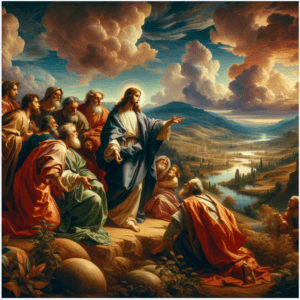 We have here the bargain made between Jacob and Esau about the right, which was Esau’s by birth, but Jacob’s by promise.
We have here the bargain made between Jacob and Esau about the right, which was Esau’s by birth, but Jacob’s by promise.
It was for a spiritual privilege; and we see Jacob’s desire of the birth-right, but he sought to obtain it by crooked courses, not like his character as a plain man.
He was right, that he coveted earnestly the best gifts; he was wrong, that he took advantage of his brother’s need. The inheritance of their father’s worldly goods did not descend to Jacob, and was not meant in this proposal.
But it includeth the future possession of the land of Canaan by his children’s children, and the covenant made with Abraham as to Christ the promised Seed.
Esau, exhausted from working in the field, has requested some of Jacob’s red stew. Jacob has demanded Esau’s birthright as payment (Genesis 25:29–31). Esau has foolishly and hastily agreed.
Now Jacob closes the deal by asking Esau to bind himself with an oath. Oaths were taken with great seriousness in this era. Esau quickly swears the oath and sells his firstborn rights.
We’re amazed at both men here.
First, Esau strikes us as a careless fool who would value his birthright so little. He might have thought that Jacob was joking, at first.
But asking him to swear an oath, in that day, was the equivalent to signing a modern written contract. Esau is, at the very least, being reckless.
Second, Jacob comes off as cold and calculating, unconcerned about taking advantage of his brother’s irresponsibility and need for immediate gratification of his appetite.
He’s leveraging the situation for his own benefit, and at great cost to Esau. Neither brother is very likable in this moment.
Genesis 25:34 KJV
Then Jacob gave Esau bread and pottage of lentiles; and he did eat and drink, and rose up, and went his way: thus Esau despised his birthright.
 Believing Jacob valued these above all things; unbelieving Esau despised them.
Believing Jacob valued these above all things; unbelieving Esau despised them.
Esau ate and drank, pleased his palate, satisfied his appetite, and then carelessly rose up and went his way, without any serious thought, or any regret, about the bad bargain he had made.
Thus Esau despised his birth-right. By his neglect and contempt afterwards, and by justifying himself in what he had done, he put the bargain past recall.
People are ruined, not so much by doing what is amiss, as by doing it and not repenting of it.
With Esau’s sworn oath that his birthright was now his brother’s, Jacob delivers his part of this crazy deal (Genesis 25:29–31). He gives his brother bread and a bowl of what turns out to be lentil stew.
We may have been picturing “red stew” as a meaty soup instead of a bowl of beans. Esau has sold his birthright for a bowl of bean soup, and Jacob has taken that birthright as his own.
Through a combination of Esau’s recklessness and Jacob’s trickery, this has become an outrageously expensive arrangement for Esau.
If two children made such a lopsided deal these days, it’s likely a parent would step in and reverse the trade, giving each child a stern talking to.
But the deal made between these two full-grown men will stand, as we’ll see in the following chapters. The swearing of an oath, in that era, was as binding as the signing of a modern written contract.
The chapter ends with what appears to be an obvious statement. Esau “despised” his birthright. He didn’t hold it with the value it was worth, and did not take care to protect it.
This choice will carry consequences for the rest of his life, and even into history (Hebrews 12:16). “Esau despised his birthright” is the important thing to see at this juncture. So Esau sat down and ate his stew.
He had surrendered his birthright because it meant nothing to him. Nothing that was spiritual meant anything to him. Unfortunately, I’m afraid we have church members like that.
They have no spiritual capacity and no understanding of spiritual truths. I believe that the mark of a true Christian is one whom the Spirit of God can teach and guide.
It is as if a man today had a very valuable heirloom, let’s say an old family Bible which had belonged to his grandfather. Another grandson wants it and offers to give him a quarter for it.
So the owner says, “Give me the twenty-five cents because I was going to throw the old thing away anyway.” That is exactly what Esau would have done.
But Jacob is wrong also, and we’ll see more of his cleverness and trickery in chapter 27.
I hope that you have really enjoyed this post,
Please Leave All Comments in the Comment Box Below ↓

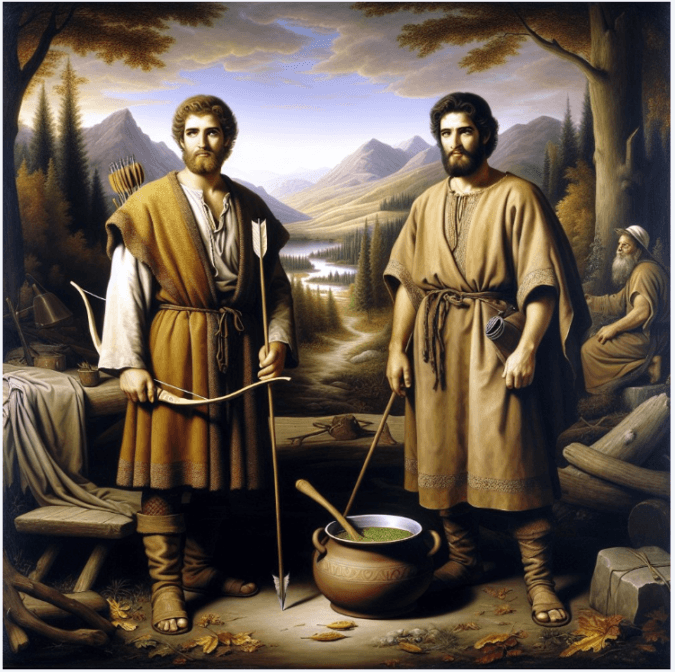











Thank you for this insightful exploration of Esau and Jacob!
The dynamics between the two brothers are fascinating, especially regarding themes of rivalry and redemption. I appreciate how you highlighted the cultural and spiritual implications of their story. It’s interesting to see how these narratives still resonate in contemporary discussions about identity and family.
From my experience studying biblical texts, I’ve often found that the stories of sibling relationships offer profound lessons.
Have you considered exploring how their story reflects broader themes of forgiveness and reconciliation?
I believe that aspect could lead to rich discussions.
Thanks again for shedding light on this complex narrative!
Regards
Aris
Hi Aris,
Thank you so much for your thoughtful response! I’m glad you found the exploration of Esau and Jacob compelling. You’re absolutely right—sibling dynamics in biblical texts often open up rich discussions about identity and family.
Your suggestion to delve into themes of forgiveness and reconciliation is excellent. Esau and Jacob’s story indeed provides a nuanced view of these themes, particularly in how their relationship evolves over time. I’d love to explore this angle further and consider how their eventual reconciliation mirrors broader spiritual and cultural lessons.
Thanks again for your engaging insights and for prompting this deeper reflection.
Best regards,
Blessings My Friend!
What an interesting story, I believe Esau did not care about the birth right issue from the onset and that’s why he so cheaply traded it with pottage.
The account has quite a number of object lessons we can learn today. Rebecca’s favoritism and consequent advice to cheat Isaac resulted in her not seeing her son again as Jacob had to spend 20 years at Laban’s place. Favoritism and cheating tears families apart.
Hello Elias,
Thanks for stopping by HBS & DwJ to leave your comment.
You’ve made some insightful points about the story of Esau and Jacob. Indeed, Esau’s disregard for his birthright and Rebecca’s favoritism illustrate the destructive consequences of valuing short-term gains over long-term integrity and the impact of favoritism on family dynamics.
It’s a powerful reminder of how personal choices can ripple through relationships and influence the course of our lives.
Thanks again,
Blessings My Friend!
This is an article about Esau and Jacob, two brothers in the Bible.
It discusses their rivalry for a birthright that gives the holder special spiritual privileges. Esau sells his birthright to Jacob for a bowl of stew because he does not value spiritual things. Jacob tricks Esau into giving up his birthright.
While both brothers behave poorly, the story teaches important lessons about family and forgiveness.
Hello Petr,
Absolutely!
The story of Esau and Jacob is rich with lessons about the consequences of our choices and the importance of valuing what truly matters. It also highlights the complexity of family dynamics and the potential for reconciliation, despite past grievances. The rivalry and deception between the brothers remind us of the impact of our decisions and the possibility for growth and forgiveness within families.”
Thanks for stopping by HBS & DwJ,
Blessings My Friend!
The way you broke down their relationship and the significance of their story was both insightful and easy to follow.
I especially appreciated how you highlighted the theme of forgiveness and reconciliation, which is such a powerful takeaway.
It made me think—do you believe that Esau’s forgiveness of Jacob was a turning point for both of them spiritually?
I also found your explanation of the birthright really interesting—how important do you think that moment was in shaping their futures?
Thanks for sharing such a thoughtful piece!
Hello Bob,
Thank you so much for your kind words!
I’m really glad you found the breakdown of their relationship and the theme of forgiveness meaningful.
To address your questions, I do believe that Esau’s forgiveness of Jacob was indeed a significant turning point for both of them. It not only repaired their personal relationship but also set the stage for their spiritual growth and the future of their respective families. Esau’s willingness to forgive was a profound act of grace, and it likely had a deep impact on both of their spiritual journeys.
As for the birthright, it was crucial in shaping their futures. It represented more than just material wealth—it was tied to their destinies and the divine promises given to their family. Jacob’s acquisition of the birthright marked a pivotal shift in their narratives, influencing the direction of their lives and the future of their descendants.
I appreciate your thoughtful questions and the opportunity to dive deeper into these aspects.
Thanks again for your engagement!
Blessings My Friend!
This is a fascinating story from the Old Testament and it brings up some great questions about the sovereignty of YHWH and his plans for mankind.
If Jacob did not manage to trick Esau out of his inheritance, would the Messiah now come from the line of Esau?
What about the matter of free will and predestination?
Does YHWH just treat us as puppets that have to carry out his plan or does he simply know what we are going to do ahead of time and plan accordingly?
What role did YHWH have Esau play?
Jewish history tells us that the reason Esau was so exhausted when he showed up famished and Jacob bargained away his birthright was that Esau had just fought Nimrod, the mighty hunter who ruled many kingdoms to the death and cut off his head. He had to flee from Nimrod’s subjects for his life.
If anything this should teach us about how great the grace of YHWH is, that He can use anyone to accomplish his purposes, so don’t give up that He can use you!
Hello Stone,
You’ve raised some profound and thought-provoking questions!
The interplay between divine sovereignty and human free will is indeed a central theme in many religious and philosophical discussions.
Messiah from Esau’s Line: If Jacob hadn’t tricked Esau, it’s an intriguing thought to consider whether the Messiah might have come from Esau’s line. In biblical tradition, God’s plans often unfold in ways that are mysterious to us, and it’s possible that the Messiah could have emerged from any lineage as part of a larger divine strategy.
Free Will and Predestination: This is a classic debate. Some view YHWH’s foreknowledge as consistent with human free will, meaning that while God knows the choices we will make, this knowledge doesn’t force our actions. Others see a more deterministic view where God’s sovereignty might shape the course of events while still allowing for genuine human agency.
Role of Esau: Esau’s role in the biblical narrative is complex. He is often seen as a foil to Jacob, embodying different values and traits. The story illustrates how even those who might seem to be on the periphery of God’s plan are integral to the larger narrative.
Grace and Usefulness: Your point about YHWH’s grace is powerful. The idea that God can use anyone, regardless of their past or circumstances, is a comforting reminder of the boundless nature of divine grace. It emphasizes that no matter where we are in life, there is always potential for meaningful contribution and purpose.
These reflections highlight the depth of biblical narratives and their relevance to our understanding of divine and human interaction.
Hope this helps,
Blessings My Friend!